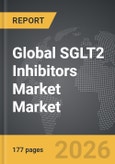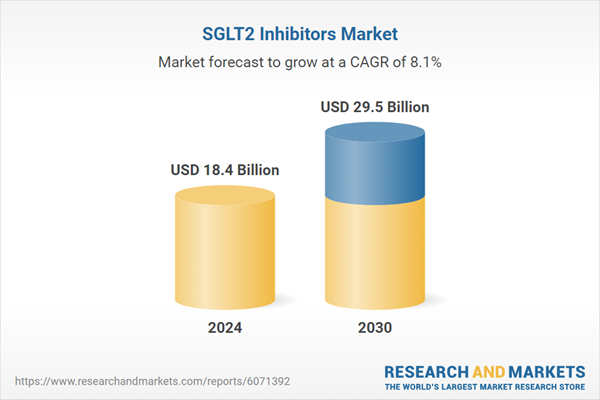Global SGLT2 Inhibitors Market - Key Trends & Drivers Summarized
Is Expanding Therapeutic Scope Transforming the Market Landscape for SGLT2 Inhibitors?
The global market for SGLT2 inhibitors is undergoing a major transformation, moving far beyond its original focus on glycemic control in type 2 diabetes. What began as a novel class of antidiabetic agents has now evolved into a cornerstone therapy in cardio-renal-metabolic care. Clinical trials over the last few years have consistently demonstrated that SGLT2 inhibitors such as empagliflozin, dapagliflozin, and canagliflozin deliver significant cardiovascular and renal protective effects independent of their blood glucose-lowering abilities. As a result, these drugs are increasingly being prescribed not only for type 2 diabetes but also for heart failure with reduced ejection fraction (HFrEF), chronic kidney disease (CKD), and more recently, heart failure with preserved ejection fraction (HFpEF). Regulatory bodies across the globe have responded by expanding approved indications, which is dramatically broadening the patient population eligible for these therapies. This shift marks a key inflection point in the market, as endocrinologists, cardiologists, and nephrologists begin to co-manage patients using a shared pharmacological tool. The repositioning of SGLT2 inhibitors as multi-disease agents is significantly boosting their clinical value, healthcare system relevance, and long-term market sustainability.Can Real-World Evidence and Guideline Inclusion Propel Mainstream Adoption?
One of the most powerful drivers behind the widespread adoption of SGLT2 inhibitors is the robust body of real-world evidence and major endorsements from global clinical guidelines. Organizations such as the American Diabetes Association (ADA), European Society of Cardiology (ESC), Kidney Disease: Improving Global Outcomes (KDIGO), and the American College of Cardiology (ACC) have rapidly incorporated SGLT2 inhibitors into their treatment protocols - not only for glucose control but as first-line therapy for heart failure and CKD, even in patients without diabetes. This cross-specialty acceptance is propelling greater confidence among prescribers, leading to earlier initiation and broader use across patient profiles. Additionally, large-scale outcomes studies continue to reinforce the drug class's benefits in reducing hospitalization for heart failure, slowing progression of kidney disease, and lowering cardiovascular mortality. These findings have been instrumental in convincing payers and formulary committees to expand reimbursement, especially in markets with value-based healthcare models. The growing repository of post-marketing surveillance data and patient registries is further validating the drugs' safety profiles, helping to dispel concerns around side effects such as diabetic ketoacidosis or genitourinary infections. This strong evidence-based foundation is making SGLT2 inhibitors one of the most rapidly adopted therapeutic classes in recent years.Are Market Dynamics and Competitive Expansion Driving Innovation in SGLT2-Based Therapies?
The commercial success of first-generation SGLT2 inhibitors has sparked a wave of R&D and competitive activity, with pharmaceutical companies racing to extend the clinical and market footprint of the drug class. The emergence of combination therapies - such as SGLT2 inhibitors paired with DPP-4 inhibitors or GLP-1 receptor agonists - is opening new avenues for integrated diabetes and metabolic disorder management. At the same time, next-generation molecules with dual or triple inhibitory activity (e.g., SGLT1/SGLT2 inhibitors) are being developed to enhance efficacy and expand therapeutic targets. Companies are also exploring novel delivery formats, extended-release formulations, and co-formulated pills to improve patient adherence and convenience. Competitive differentiation is becoming crucial as more players enter the space, particularly in generics and biosimilars as key patents begin to expire. In addition, strategic partnerships, licensing deals, and co-marketing arrangements are on the rise, as firms look to strengthen market positioning and regional access. Geographic expansion into underserved markets - particularly in Asia-Pacific, Latin America, and the Middle East - is another key strategy, enabled by growing awareness of chronic disease prevalence and improvements in diagnostic infrastructure. As the competitive field becomes more sophisticated, innovation and market agility are defining the next growth phase for the SGLT2 inhibitors category.What's Fueling the Rapid Growth of the SGLT2 Inhibitors Market?
The growth in the SGLT2 inhibitors market is driven by several factors directly tied to evolving clinical guidelines, expanding indications, and healthcare infrastructure trends. First, the shift from glucose-centric prescribing to a broader focus on cardiovascular and renal protection is significantly increasing the number of eligible patients. Second, strong support from international guidelines is driving adoption across multiple specialties, making these drugs a go-to therapy for cardiologists and nephrologists as well as endocrinologists. Third, the growing global burden of type 2 diabetes, heart failure, and chronic kidney disease is expanding the need for therapies that offer multi-organ protection and long-term outcomes. Fourth, pharmaceutical innovation is extending the life cycle of the drug class through combination therapies, expanded indications, and next-generation molecules. Fifth, improved physician awareness and education programs are encouraging earlier initiation and better adherence. Sixth, payer willingness to reimburse for SGLT2 inhibitors in high-risk patients is supporting access, especially in regions with value-based care models. Seventh, digital health integration is enabling better monitoring and long-term tracking of therapy outcomes, which is helping demonstrate real-world value. Lastly, growing patient demand for oral, once-daily therapies with proven protective benefits is reinforcing the class's appeal in chronic disease management. Together, these drivers are establishing SGLT2 inhibitors as a foundational therapy in the global fight against cardio-renal-metabolic disorders.Report Scope
The report analyzes the SGLT2 Inhibitors market, presented in terms of market value (US$). The analysis covers the key segments and geographic regions outlined below:- Segments: Indication (Type 2 Diabetes, Cardiovascular, Chronic Kidney Disease, Others); Distribution Channel (Hospital Pharmacies, Retail Pharmacies, Online Pharmacies).
- Geographic Regions/Countries: World; United States; Canada; Japan; China; Europe (France; Germany; Italy; United Kingdom; and Rest of Europe); Asia-Pacific; Rest of World.
Key Insights:
- Market Growth: Understand the significant growth trajectory of the Type 2 Diabetes Indication segment, which is expected to reach US$15.5 Billion by 2030 with a CAGR of a 8.6%. The Cardiovascular Indication segment is also set to grow at 8.8% CAGR over the analysis period.
- Regional Analysis: Gain insights into the U.S. market, valued at $4.8 Billion in 2024, and China, forecasted to grow at an impressive 7.9% CAGR to reach $4.7 Billion by 2030. Discover growth trends in other key regions, including Japan, Canada, Germany, and the Asia-Pacific.
Why You Should Buy This Report:
- Detailed Market Analysis: Access a thorough analysis of the Global SGLT2 Inhibitors Market, covering all major geographic regions and market segments.
- Competitive Insights: Get an overview of the competitive landscape, including the market presence of major players across different geographies.
- Future Trends and Drivers: Understand the key trends and drivers shaping the future of the Global SGLT2 Inhibitors Market.
- Actionable Insights: Benefit from actionable insights that can help you identify new revenue opportunities and make strategic business decisions.
Key Questions Answered:
- How is the Global SGLT2 Inhibitors Market expected to evolve by 2030?
- What are the main drivers and restraints affecting the market?
- Which market segments will grow the most over the forecast period?
- How will market shares for different regions and segments change by 2030?
- Who are the leading players in the market, and what are their prospects?
Report Features:
- Comprehensive Market Data: Independent analysis of annual sales and market forecasts in US$ Million from 2024 to 2030.
- In-Depth Regional Analysis: Detailed insights into key markets, including the U.S., China, Japan, Canada, Europe, Asia-Pacific, Latin America, Middle East, and Africa.
- Company Profiles: Coverage of players such as Amway, Aytu BioPharma Inc., BioFilm Inc., BioXgenic LLC, Church & Dwight and more.
- Complimentary Updates: Receive free report updates for one year to keep you informed of the latest market developments.
Some of the 39 companies featured in this SGLT2 Inhibitors market report include:
- Astellas Pharma Inc.
- AstraZeneca
- Biocon Limited
- Boehringer Ingelheim
- Bristol-Myers Squibb Company
- Chugai Pharmaceutical Co., Ltd.
- Daiichi Sankyo Company Limited
- Eisai Co., Ltd.
- Eli Lilly and Company
- Glenmark Pharmaceuticals Ltd.
- Johnson & Johnson (Janssen Pharmaceuticals)
- Kissei Pharmaceutical Co. Ltd.
- Kowa Company Ltd.
- Lexicon Pharmaceuticals, Inc.
- Lexicon Pharmaceuticals, Inc.
- Lupin Limited
- Mankind Pharma Ltd
- Merck & Co., Inc.
- Mitsubishi Tanabe Pharma Corporation
- Novartis International AG
- Ono Pharmaceutical Co., Ltd.
- Pfizer
- Sanofi
- Sihuan Pharmaceutical Holdings Group Ltd.
- Sumitomo Dainippon Pharma Co. Ltd.
- Sun Pharmaceutical Industries Ltd
- Taisho Pharmaceutical Holdings Co.
- TheracosBio, LLC
- Torrent Pharmaceuticals Ltd
- Youngene Therapeutics Inc. Ltd
This edition integrates the latest global trade and economic shifts into comprehensive market analysis. Key updates include:
- Tariff and Trade Impact: Insights into global tariff negotiations across 180+ countries, with analysis of supply chain turbulence, sourcing disruptions, and geographic realignment. Special focus on 2025 as a pivotal year for trade tensions, including updated perspectives on the Trump-era tariffs.
- Adjusted Forecasts and Analytics: Revised global and regional market forecasts through 2030, incorporating tariff effects, economic uncertainty, and structural changes in globalization. Includes historical analysis from 2015 to 2023.
- Strategic Market Dynamics: Evaluation of revised market prospects, regional outlooks, and key economic indicators such as population and urbanization trends.
- Innovation & Technology Trends: Latest developments in product and process innovation, emerging technologies, and key industry drivers shaping the competitive landscape.
- Competitive Intelligence: Updated global market share estimates for 2025, competitive positioning of major players (Strong/Active/Niche/Trivial), and refined focus on leading global brands and core players.
- Expert Insight & Commentary: Strategic analysis from economists, trade experts, and domain specialists to contextualize market shifts and identify emerging opportunities.
Table of Contents
Companies Mentioned (Partial List)
A selection of companies mentioned in this report includes, but is not limited to:
- Astellas Pharma Inc.
- AstraZeneca
- Biocon Limited
- Boehringer Ingelheim
- Bristol-Myers Squibb Company
- Chugai Pharmaceutical Co., Ltd.
- Daiichi Sankyo Company Limited
- Eisai Co., Ltd.
- Eli Lilly and Company
- Glenmark Pharmaceuticals Ltd.
- Johnson & Johnson (Janssen Pharmaceuticals)
- Kissei Pharmaceutical Co. Ltd.
- Kowa Company Ltd.
- Lexicon Pharmaceuticals, Inc.
- Lexicon Pharmaceuticals, Inc.
- Lupin Limited
- Mankind Pharma Ltd
- Merck & Co., Inc.
- Mitsubishi Tanabe Pharma Corporation
- Novartis International AG
- Ono Pharmaceutical Co., Ltd.
- Pfizer
- Sanofi
- Sihuan Pharmaceutical Holdings Group Ltd.
- Sumitomo Dainippon Pharma Co. Ltd.
- Sun Pharmaceutical Industries Ltd
- Taisho Pharmaceutical Holdings Co.
- TheracosBio, LLC
- Torrent Pharmaceuticals Ltd
- Youngene Therapeutics Inc. Ltd
Table Information
| Report Attribute | Details |
|---|---|
| No. of Pages | 177 |
| Published | February 2026 |
| Forecast Period | 2024 - 2030 |
| Estimated Market Value ( USD | $ 18.4 Billion |
| Forecasted Market Value ( USD | $ 29.5 Billion |
| Compound Annual Growth Rate | 8.1% |
| Regions Covered | Global |









